

Choosing the right yacht register

Gabriel Gonzalez, Register-a-Yacht, explains how buyers should choose where to register their yacht.
Registering a newly acquired yacht is often one of the last steps that yacht owners will need to complete before they can actually sail and enjoy the vessel. Registering a yacht is like obtaining a passport. You are effectively choosing the yacht’s nationality, with all the advantages and responsibilities that this entails: not least good functionality, constructive legislation, fiscal efficiency, well-recognised legal system, political stability and diplomatic clout. A yacht owner will want a flag that is competitive, accessible and enjoys a good reputation.
“Registering a yacht is like obtaining a passport. You are effectively choosing the yacht’s nationality, with all the advantages and responsibilities that this entails”
From a private law perspective, too, your choice of Flag State can be critical. Protecting the legal title of the registered owner or the interests of mortgagees is of great importance. In fact, many financial institutions may make it a condition that a yacht is registered in a particular Flag State when providing marine finance to yacht owners. Similarly, a yacht’s Flag State may affect the ability of the owner to secure competitive insurance cover.
So while yacht registration is simply a licensing procedure, involving broadly similar requirements in most jurisdictions, it is one that yacht owners should give very careful consideration to in order to ensure the best fit for their particular circumstances.
Many countries, including some that are landlocked, maintain their own yacht registries, but only a very few attract the majority of superyacht registrations worldwide. Their popularity is based upon careful analysis of the advantages that they offer to owners and their vessels.
There are three principal factors that will undoubtedly influence an owner’s choice of flag.
Getting the right legal and administrative framework
Firstly, a Flag State’s legal and administrative framework. By conferring nationality on a yacht, a Flag State acquires certain rights as well as certain responsibilities over it. The public law functions of registration give rights to diplomatic (and naval) protection and consular assistance by the Flag State. It might also offer other privileges, such as neutrality or access to particular waters, ports, activities or services. The private law functions of registration are to protect the title of the registered owner and persons holding security interests over the vessel.
“By conferring nationality on a yacht, a Flag State acquires certain rights as well as certain responsibilities over it.”
It is essential that a Flag State Registration is a key element to a yacht’s operation because there may also be specific yacht-related legislative, fiscal and other advantages (or disadvantages) attached to a particular kind of registration regime. For instance EU-flagged yachts will encounter fewer obstacles when obtaining permits and licenses to operate commercially within EU waters in comparison to non-EU flagged yachts. There are always exceptions to the rule and flags such as the Isle of Man, while remaining outside the EU, offer very similar benefits to EU flags when operating commercially. The Marshall Islands’ flag is also exempted for having to change from private to commercial status when operating commercially in France and Monaco.
VAT and other taxes
“The question of VAT liability is open to wide interpretation and should always be considered on a case-by-case basis.”
Secondly, the VAT status of the jurisdiction in which the yacht is to be domiciled. The question of VAT liability is open to wide interpretation and should always be considered on a case-by-case basis. Yet this is generally a matter of great concern to yacht owners and is often the main criterion in deciding where to register a yacht. The EU’s Temporary Admission (often referred to as Temporary Importation) rules are a mechanism that enables non-EU resident yacht owners to bring their yachts into Europe for a limited time, such as a holiday, and under certain conditions without having to pay VAT on the value of their yachts.
International rules and conventions
“Through registration and technical control procedures, the Flag State monitors the legality of the vessel’s condition and activities throughout its life”
Lastly, given the freedom that Flag States have to formulate their registration requirements, they are obliged to exercise administrative, technical and social controls – applying the international rules and conventions that govern navigation, usage, safety and crewing. Through registration and technical control procedures, the Flag State monitors the legality of the vessel’s condition and activities throughout its life, and intervenes through inspections and financial concessions.
As a back up to Flag State implementation, many of the International Maritime Organisation’s (IMO) most important technical conventions contain provisions for ships to be inspected when they visit foreign ports to ensure that they meet IMO requirements, a procedure known as Port State Control.
The IMO has encouraged the establishment of regional agreements on Port State Control – Memoranda of Understanding or MOUs – covering all of the world’s oceans, of which the best known are the Paris MOU (Europe and the North Atlantic) and Tokyo MOU (Asia and the Pacific). It is therefore of great importance that a Flag State can demonstrate a good track record on its performance under such MOUs. There is scope for a flexible approach and the expertise of a Flag State’s surveyors will be crucial for prudent assessment, good support on technical issues and to guarantee safety and seaworthiness.
In addition to these three main aspects, there may be many other reasons for choosing a Flag State. These could relate to: a yacht’s age, size or type; any ownership nationality restrictions; the size of registration fees and ongoing costs; the speed and ease of registration; the accessibility and availability of technical or administrative support. In some cases, it may simply be a matter of prestige.
“It is unquestionably the Red Ensign Group that lead the rankings of most popular flags”
Of all the Flag States available worldwide, it is unquestionably the British shipping registers, collectively known as the Red Ensign Group (REG), that lead the rankings of most popular flags. British law has enacted legislation that is specific to yachting and is a familiar, popular and workable system that is well known to practitioners, captains, brokers, bankers, builders, classification societies and service providers within the yachting industry. As well as having a reputation for efficient management and administration, they also benefit from British Consular support.
Within the REG, the following are the most common flags for yacht registration purposes – the UK itself, the Cayman Islands, the British Virgin Islands, the Isle of Man, Jersey, Guernsey and Gibraltar. These seven jurisdictions offer five different tax scenarios, with the UK – as a full EU Member state and part of the EU Customs Union and VAT area – lying at one extreme, with the Cayman Islands and BVI – which are wholly outside the EU – at the other.
In between lie the Isle of Man, the Channel Islands and Gibraltar, which have differing relationships with the EU. The latter in particular, being part of the EU territory but outside the EU Customs Union and VAT area, can offer a less bureaucratic procedure for obtaining chartering licences in Europe while at the same be of use to non-EU residents in benefitting from the Temporary Admission regime.
“Flying the British flag is not always the solution and other Flag States, such as Malta or the Marshall Islands for example, have been very successful in providing yacht registration”
Notwithstanding all the benefits that the REG may offer, flying the British flag is not always the solution and other Flag States, such as Malta or the Marshall Islands for example, have been very successful in providing yacht registration to yacht owners and yacht management companies.
The pragmatic approach of Malta with tax advantages for commercial yachts and a leasing scheme for pleasure yachts has made it a very attractive alternative to the UK for those wishing to flag a yacht within the EU. Marshall Islands-registered yachts have automatic rights to a cruising permit for sailing in US territorial waters and qualifying private yachts are permitted to charter up to 84 days a year, subject to detailed surveys when on charter. Together with the new Yacht Engage in Trade (YET) regime, the Marshall Islands is taking a lead in facilitating the mixed use of yachts. Other flags to be considered, within and without the EU, are Madeira, Italy, Luxembourg, Cyprus, the Cook Islands, St Vincent & the Grenadines and The Bahamas.
Finally, it is worth mentioning that the use of a company for yacht ownership purposes may also facilitate legitimate tax and estate planning scenarios, provide access to certain flags by circumventing nationality restrictions and offer enhanced levels of confidentiality. Using a company to own and operate a yacht not only provides privacy, but will also limit the owner’s liability in the event of a claim. Contracting with third parties through an entity provides legal security and may often simplify sale and purchase processes.
For more details please contact: [email protected]
Subscribe to our free newsletter
For more opinions from Superyacht Investor, subscribe to our email newsletter.
Subscribe here
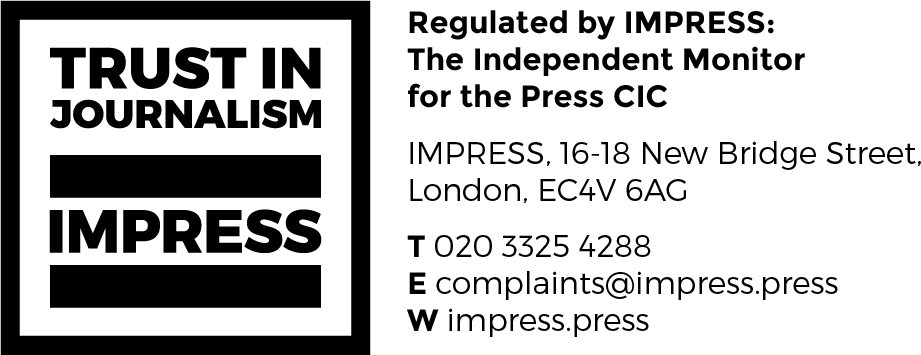
© Specialist Insight, 2024. All rights reserved. Website design and development by e-Motive Media Limited .

Andrew Henderson
Founder of Nomad Capitalist and the world’s most sought-after expert on global citizenship.
ABOUT THE COMPANY
What we’re all about
MEET OUR TEAM
Meet our 80+ global team
We’re here to serve you
Your questions answered
TESTIMONIALS
Read our testimonials
Get free email updates

ACTION PLAN
Our flagship service for entrepreneurs and investors
ACTION PLAN ELITE
Create your Action Plan directly with the Mr. Henderson himself
CITIZENSHIP BY DESCENT
Claim a second passport based on familial connections
ALL SERVICES
Click here to see all our products and services
GOING OFFSHORE
Offshore Banking
Offshore Company
Offshore Trust
Offshore Gold Storage
Offshore For Americans
SECOND CITIZENSHIP
Second Passport
Citizenship By Investment
Citizenship By Ancestry
Dual Citizenship Benefits
EU Citizenship
SECOND RESIDENCE
Second Residence
Golden Visas
Residence By Investment
EU Residence
Tax Residence
FINANCE & INVESTMENTS
Tax Reduction
International Investment
Cryptocurrency
Foreign Real Estate
Asset Protection
NOMAD LIFESTYLE
Flag Theory
Lifestyle Design
Plan B Strategy
Hiring Overseas
Living In Eastern Europe
PASSPORT INDEX
Discover the world’s best passports to have in an ever-changing world
CITIZENSHIP MAP
Explore the citizenship options using our interactive citizenship map
Explore the tax details for countries using our interactive tax map
ALL RESEARCH
Click here to see all of our research and interactive tools
THE WORLD’S #1 OFFSHORE EVENT
Learn from our R&D playbook and meet like-minded people at our annual event.
NOMAD CAPITALIST THE BOOK
Andrew Henderson wrote the #1 best-selling book that redefines life as a diversified, global citizen in the 21st century… and how you can join the movement.
Where to Register Your Yacht Offshore: the Ultimate Guide

Dateline: Belgrade, Serbia
For the person who has successfully opened an offshore bank account , got a second passport and is living the lifestyle of their dreams traveling the world, the time has come to move on to the next level of flag theory. This new level is one where the focus shifts from acquisitions that are largely for diversification purposes toward purchases meant purely to improve your lifestyle – like boating.
For many who reach this stage, the next step is to combine travel and leisure by investing in the purchase of a yacht.
Unlike buying a new car – or even a house – buying a yacht is an investment of an international nature, and deciding upon the best country for yacht registration is a decision for which you need professional advice so you do not expose your assets to unnecessary taxes and liabilities. If you go into the process uneducated, your exciting new purchase might just become nothing more than a hole in the water into which you pour unnecessary amounts of money.
As with other international strategies, the country in which you register your yacht can have an enormous effect on the amount of money you will be able to save, as well as your freedom of travel. Some countries keep you from freely traveling to other jurisdictions, others charge high tax percentages or registration fees, and others do none of those things.
Choose Your Flag Wisely
When buying a yacht, the choice of yacht flags is one of the most important decisions you have to make because it can have a direct effect on your privacy, taxes, and your exposure to liability. Just as you would create a corporate structure to protect your other assets, you should do the same when it comes to yacht registration.
For this reason, many boat owners opt to register their yacht in places like the Cayman Islands to avoid the onerous taxes and regulations of the United States and other western governments. Panama , with its favorable registration policies, is the largest ship registry in the world with over 9,000 ships flying its flag.
However, it’s also very important to do your due diligence in selecting a country for yacht registration by working with a professional. Once your vessel is registered in a country, all of the country’s laws will apply to your boat. Many countries that have attractive tax structures have other issues that you’ll want to avoid, such as laws that require you to hire a crew completely composed of nationals from that country.
You will also want to register your yacht in a country that is well respected by the US and the EU. If you choose a country with a bad reputation, it can limit where you are allowed to travel, or at the very least, make you subject to more detentions and inspections.
The flag state has the responsibility to enforce regulations over vessels registered under its flag, so yacht registration under countries on the Paris Memorandum of Understanding (Paris MoU) on Port State Control’s black or gray list will come under more scrutiny in inspections. Because of this, a large majority of yachts are flagged in British Overseas Territories, known as the ‘Red Ensign Group’ — including Bermuda, Gibraltar and the Isle of Man.
These countries have acceptable safety regulations for travel in EU countries, while also having more attractive tax structures than the UK. In fact, company tax is set at 0% in the Channel Islands , the Isle of Man, the Cayman Islands, and Bermuda .
This is particularly useful for those who wish to spend time in European Union waters, as vessels owned or used by EU residents are subject to the EU’s Value Added Tax (VAT). Private yacht registration with a non-EU flag allows an owner to operate under a “temporary importation structure” which allows for 18 months free of these taxes or customs duties. After the 18 months are over, the boat owner can re-apply for this status.
Bearing this in mind, let’s take a look at some of my favorite countries for yacht registration.
1.The Cayman Islands
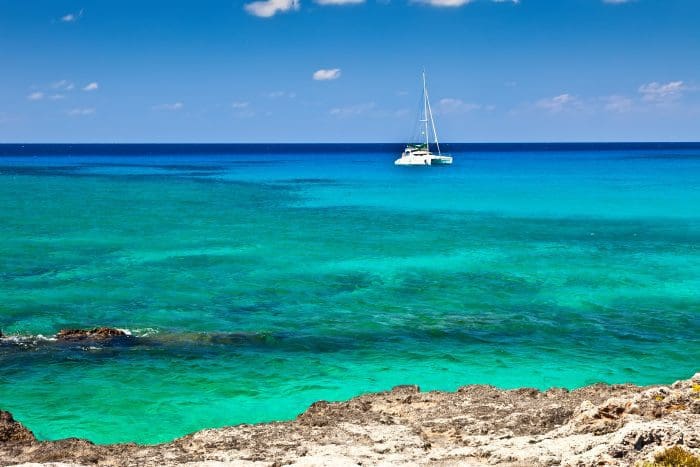
The Cayman Islands Shipping Registry is a favorite among people who own both pleasure and commercial yachts worldwide. This ship registry has been at the Port of George Town, Cayman Islands since 1903. There are two other ports in the Cayman Islands as well: The Creek in Canyon Brac and Bloody Bay in Little Cayman.
The Merchant Shipping Law, which was revised in 2016, is the governing legislation for all boats registered in the Cayman Islands. The law offers many different types of yacht registration, including full registration, interim registration, provisional registration, a ship under construction registration, and demise charter/bareboat registration. An owner who is having a vessel built might find this convenient so he or she can register it as a boat under construction and then change to full yacht registration later.
As I mentioned above, the Cayman Islands is a part of the Red Ensign Group. This means that getting your yacht registration in the Cayman Islands flags your vessels as a British Ship, granting it protection by the British Royal Navy.
Because time is crucial for so many people, the Cayman Islands Ship Registry (CISR) can also expedite the registration process for those who need to be registered immediately if they pay their expedition fee. In addition, the CISR has representative offices in Fort Lauderdale, London, Cannes, Athens, Tokyo, and Singapore where you can have ship registry certificates issued immediately if needed.
Yachts that are registered with the Cayman Islands as pleasure yachts and are not engaged in trade are granted a License to Cruise the water of the United States which will allow them to enter, depart, and cruise within U.S. waters. These vessels will only need to report to U.S. customs when entering the country or changing customs districts.
Assuming you meet all of the required qualifications, there are no restrictions or rules concerning the nationality of the master or the crew of your ship. In addition to the Cayman Islands being a tax neutral environment, the jurisdiction provides vessel owners with banking facilities and directorship services.
Overall, vessels registered in the Cayman Islands benefit from all the privileges of the British flag, while simultaneously having the tax-free and confidentiality perks of the Cayman Islands.
2. The Netherlands

Many people consider Holland to be an ideal location for yacht registration because the country is flexible and straightforward, whereas most other European countries follow stricter rules and regulations. The registration process is fast compared to that of other countries and requirements are minimal.
To register under the Dutch flag, the process is easiest if you are either an EU citizen, Swiss, Norwegian, or own a company registered in the EU.
One of the main advantages of the Netherlands is that you can be registered under the Dutch flag in as little as three days. That is why Holland is typically preferred over countries like Italy, France, and Spain where there is a longboat registration process in addition to high registration fees. A lot of yacht owners solve this problem by registering under the Dutch flag. Taxes and registration requirements in the Netherlands are minimal, allowing the whole process to be completed in three days, assuming you meet the necessary criteria.
Boat owners do not have to be of Dutch nationality, nor do they have to have a residence in the country. The only documents you must have are an ID card or passport and you must provide proof of ownership of your boat. Because so little documentation is needed, renewing your yacht registration is also a fairly simple process.
The process is easiest, however, for people who are Dutch, Swiss, Norwegian or have a company based in the EU. If you are not Dutch, Swiss, or Norwegian, and if you do not have a company registered in the EU, you can still register by paying a fee to have a United Kingdom Ltd. set up in your name.
The Ltd. will cost you 349 EUR upfront and 249 EUR every year after that. Once the Ltd. is set up, you’ll receive your registration within three to five days. The documentation needed is still the same. It only costs about 299 EUR for yacht registration in Holland if you are an EU citizen. It costs 648 EUR for non-EU citizens and your registration license can be delivered overnight anywhere in the world. Those prices include everything from the taxes to the mandatory Dutch address and all the costs for shipping and consultation.
There is also no requirement to have your boat inspected, making the vessel documentation process even simpler.
Types of yacht registration under the Dutch flag:
1. Light registration
Light yacht registration is for people who want fast and easy registration for navigating EU waters. With light registration, you can only sail European Union waters and the length of your yacht may not exceed 24m.
2. Global registration
Global yacht registration is for yachts that will navigate outside of European Union waters, sail worldwide, or be engaged in commercial chartering. People with Global registration can sail worldwide. Global registration is also available to Swiss or Norwegian persons regardless of whether or not they have a company in the EU.
3. The Marshall Islands
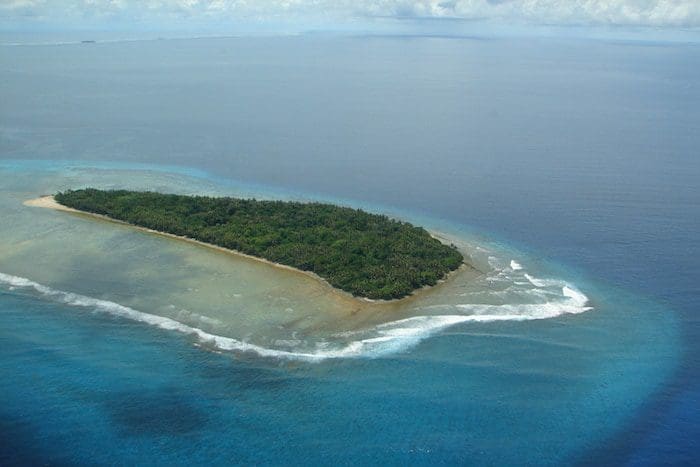
The Marshall Islands ship registry was formed in 1988. In 2001, it was expanded to allow those with commercial and private yachts to register as well, which has made the Marshall Islands a popular place to register over the last sixteen years.
The jurisdiction has also gained a lot of recognition over the years by having regional offices in major maritime cities around the world, allowing them to provide same day service to anyone, regardless of the location or time zone in which they reside.
The Marshall Islands Registry is the third-largest in the world and you can register under a one or three-year program.
You must be a Marshall Islands citizen, national, or qualified foreign maritime entity to register in the Marshall Islands. The terms “citizen” and “national” refer to Marshall Islands corporations, limited liability companies, partnerships, and associations of individuals. (You can easily complete the process to have a Marshall Islands company registered in your name so you can register your ship there.)
Assuming you complete all the necessary documents and meet all requirements, you can have your ship registered within 24 hours; you can also register your yacht as a ‘ship under construction’ if needed. You can obtain a U.S. cruising permit as a boat registered in the Marshall Islands and commercially compliant yachts can charter in Europe. In other words, you are not confined to the waters of the Marshall Islands alone, which is convenient for those who want to see more of the world.
As long as you meet proper flag requirements, yachts measuring 18m or longer that weigh less than 500 gross tons can be chartered out for up to 84 days as a private yacht limited charter (PYLC).
In addition to being white-listed under Paris and Tokyo’s MoUs, the Marshall Islands also meets the flag criteria for a low-risk ship under the Paris New Inspection Regime. Additionally, the Marshall Islands has been a part of the U.S. Coast Guard’s Qualship 21 roster for 11 consecutive years.
The Marshall Islands Registry is low tax and respected worldwide; the country is a presidential republic in free association with the United States and enjoys similar benefits to its British Overseas Territory counterparts making it a great jurisdiction for yacht registration.

Cyprus is the third largest island in the Mediterranean after Sicily and Sardinia. The country’s ship registry ranks 10th in the world with a gross tonnage of over 21 million pounds.
A ship can be registered in Cyprus if more than 50% of the shares of the registering company are owned by a Cypriot or if your company is registered in the Republic of Cyprus. An offshore company can also be registered in Cyprus if the company’s control is in the hands of Cypriots.
The Republic of Cyprus can easily register your company under their flag so you can register your yacht there. The costs of yacht registration and management are the lowest in Europe , making the jurisdiction an ideal, convenient place for many owners to register their ship.
There are many tax benefits that come with yacht registration under the Cyprus flag. An owner whose ship is registered in Cyprus is fully exempt from income taxes from operations in international waters. Additionally, no tax is payable for the wages of the crew that operates in international waters. No tax is payable on any dividend received from a shipping company in Cyprus.
Cyprus has maritime offices around the world, allowing them to work with anyone anywhere at any time. Some of their main offices are located in New York, London, Rotterdam, Piraeus, Brussels, and Hamburg. Upon registering in one of these offices, you will have the benefits of flying an EU flag, which is respected worldwide. According to the EU registry, “Sailing under EU flags demonstrates strength and represents a strong reputation.”
Like some of the other countries I have mentioned, Cyprus has been white-listed among the Paris and Tokyo MoUs, meaning it is a high-quality flag with low risk compared to many other countries who have been gray or black-listed.
It should also be noted that Cyprus is excluded from the “list of targeted flag states,” which is kept by the U.S. Coast Guard. Cyprus’s absence from the list means that inspections of the yacht with a Cypriot flag are kept to a minimum and they will experience no unnecessary delays when entering and leaving ports.
Types of yacht registration:
Cyprus offers three types of registration, including provisional registration, permanent registration, and parallel (bareboat) registration.
1. Provisional remains in effect for 6 months; after expiration, it can only be renewed once more for 3 more months.
2. Permanent Yacht Registration goes into effect 6 to 9 months from the date your yacht was provisionally registered.
3. For Parallel / Bareboat Registration your ship must hoist the Cyprus flag and “Limassol” must be marked as your port of registry. Parallel-in lasts for two years and is renewable. For parallel-out registration, your ship must hoist the foreign flag rather than the Cyprus flag and your port of registry must be the port of the foreign country. Parallel-out lasts for three years and is also renewable.

Liberia is the oldest democracy in Africa and one of the first offshore, zero tax jurisdictions. The Liberian ship registry is a favorite among owners of large vessels; the country has the second-largest registry in the world and makes up 12% of registered ships worldwide.
One of the perks of The Liberian Yacht Registration is that it is open to any ship-owner in the world and there are absolutely no restrictions on the nationality of your crew or country of construction. This makes Liberia appealing to many ship-owners who either cannot register somewhere because of their nationality or can only register by paying an additional fee.
Liberia has been white-listed on the Paris and Tokyo MoUs and has also been approved by the International Maritime Organization AND the U.S. Coast Guard. This, combined with the country’s other features, means that the Liberian Registry is known as “the world’s largest quality registry, renowned for excellence, efficiency, safety and innovative service”.
The following types of vessels can be registered in Liberia:
Vessels under construction, new buildings, vessels being transferred from other flags, offshore vessels, vessels in lay-up, and vessels involved in international, coastal, or domestic trading. You may also have a dual flag if your ship is bareboat registered.
The Liberian Registry is owned and operated by the United States. Additionally, service is available 24 hours a day, 7 days a week, making things very convenient for those wishing to do yacht registration under the Liberian flag. There are over 400 nautical inspectors, so there is always someone available to attend to vessels.
Vessels registered in Liberia are taxed with a fixed fee, which depends on the tonnage of your ship. The tax is applied yearly, so there should be no surprises. However, t here are no taxes on operations and your profits are not assessed.
The Liberian flag is accepted in many EU countries — the United Kingdom, Germany, and Holland are only a few countries in the European Union that accept the Liberian flag. In addition, Liberia is highly rated for safety and accident prevention, which makes this country even more attractive for your yacht registration.
Liberia is recognized every year for having high standards. The country has an above-average performance in safety and accident prevention as well as in independent statistical reports. Liberia also has a network of 100 security inspectors to inspect ships when necessary; this is something that was implemented post-9/11.
According to information provided by the Liberian Registry website, “The “Maritime Services Award” is for exceptional achievement or contribution to any service sector of the America’s maritime industry by a company, individual, or organization. According to Lloyd’s List criteria for this award, “The winner must be able to demonstrate how they have set themselves apart, going above and beyond best practice to offer the shipping industry something exceptional.”
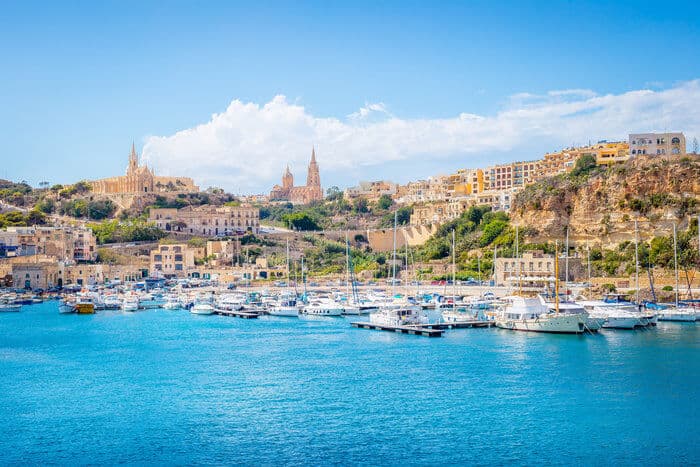
The Maltese ship registry is the largest in Europe and one of the largest in the world; it is one of the most popular countries in the world for pleasure yacht registration. The country has EU compliant legislation, clear laws relating to yacht mortgages, low registration costs and is well respected across the globe.
Malta became a member of the European Union in 2004, so yacht registration here comes with the perks of sailing an EU flag, including protection by the British Royal Navy. Like the other countries I’ve mentioned, Malta has been white-listed, providing ship-owners with a sense of security when you go through the yacht registration process under the Maltese flag.
If you’re an EU, EEA, or Swiss national, you can hold your vessel in your personal capacity. However, if you’re a non-EU/EEA/Swiss citizen you must hold your yacht through a Maltese or foreign company.
When it comes to taxes, it is important to note that companies operating commercial yachts out of Malta are exempt from income tax on any income generated by the operation of their yachts. They are also exempt from any VAT tax on the high seas. What sets Malta apart from many other countries besides tax policy is that there are no restrictions on the nationality of the master, officers, or crew of your ship.
Another perk that Malta shares with Liberia is that there is round-the-clock service, so you can feel safe and secure registering in the country. And, as long as you meet all flag requirements, any type of vessel can be registered — that means pleasure yachts, oil rigs, vessels under construction, and anything in between.
W hen it comes to the age or trading, boats between 10 and 15 years must pass inspection by an authorized inspector within one month of provisional registration and ships over 15 years old must pass inspection before being provisionally registered.
7. The British Virgin Islands
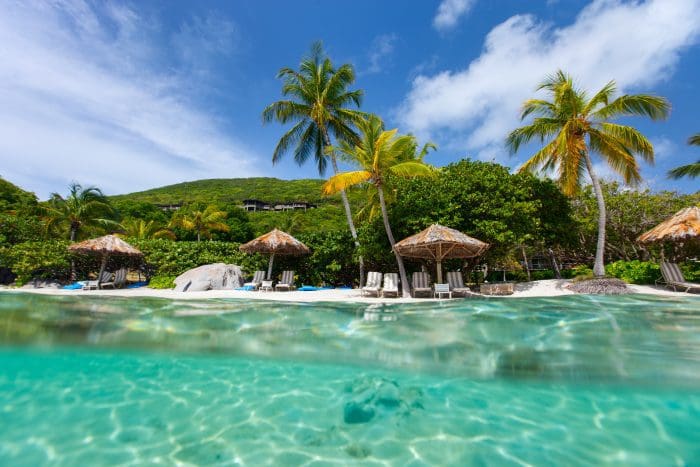
The British Virgin Islands is the latest country to join the Red Ensign Group (2014). Now, the British Virgin Islands can register any type of ship and any size. Not only that, yacht registration under the BVI flag grants access to all the ports in the world. There are restrictions with almost all other registries when it comes to this, so the fact that a BVI flag gives you access anywhere sets the country far apart from the rest.
Another advantage that makes the jurisdiction one of the most attractive is that the British Virgin Islands is tax neutral. The islands are outside the scope of the EU value added tax (VAT) laws, meaning that there is no sales tax when purchasing goods or services.
As is the case with the Cayman Islands and Malta, the Red Ensign Group flag grants protection by the British Royal Navy to those vessels registered under the British Virgin Islands flag. Similar to the other countries listed, you can register under the BVI flag even if you are not a citizen and even if you do not own a company there; you will need to register a company in the BVI to do so, but this can be completed in a matter of hours.
When it comes to the registration process, it usually takes two to six months, meaning that it is not as short as some of the other countries, but it’s still not too terribly long.
As I have mentioned in previous articles, the British Virgin Islands has one of the most stable governments and economies in the world, which makes ship owners who register there feel very safe and secure when compared to other countries who have more enemies or corruption within the government.
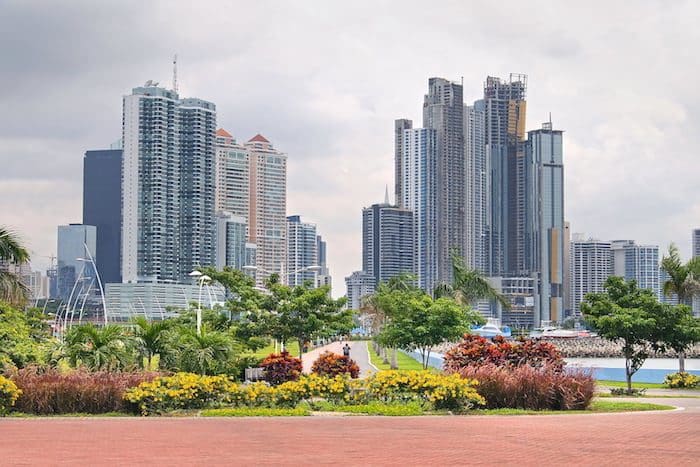
Panama is not only a popular place when it comes to offshore banking or getting a second passport, it also holds the largest ship registry in the world, having over 9,000 ships registered under the country’s flag.
Most countries require a minimum amount of weight, but Panama does not. The only exception to this rule is if your ship is older than 20 years, requiring that the ship is inspected in order to be registered.
There is usually some downtime when someone transfers their ship from one flag to another, but that is not the case when you are transferring to Panama. Panama has a very simple transferring process; for example, numerous other countries make you dry dock for inspection and Panama does not. Because their process is so easy, it eliminates the concern that ship and business owners have concerning downtime.
The good news for all the shipping companies, ship owners, and merchant shipping companies is that you can have dual ship registry in Panama, but if you were registered in the other country first, you must have consent from that country to register in Panama, too.
Instead of taking your ship’s size or tonnage into consideration, Panama charges a flat yacht registration fee to keep things simple. If you are not a Panamanian or an owner of a Panamanian business, you’ll pay a flat fee of $1,500 to register your yacht. If you are Panamanian, it costs $1,000 to register your yacht. Once you are registered, you will have access to Panama’s round-the-clock service.
Additionally, once you are assigned provisional yacht registration, you have six months to provide the proper vessel documentation to transfer your provisional yacht registration to permanent registration. Your yacht registration certificate is valid for two years and renewal costs are low.
Many countries require yacht owners to pay taxes when they register their ship, but Panama does not. There are also no taxes on profit that is made through international trade. You do not have to pay taxes on wages for your crew members either. The main reason people choose to register in Panama is this lack of taxes. When registering in Panama, people are legally reducing tax costs and that would not be the case if they were to register in many other jurisdictions.
There is no one best ship registry in the world, but there are many you can choose from to keep your investment safe. Finding the right one for you will depend on what you value when it comes to naval protection, taxes, privacy, and ease of travel.
If you have already registered your vessel, where did you choose to go for your yacht registration and would you recommend it to others? Feel free to comment below.
If you liked this article and are curious about how to apply the Nomad Capitalist lifestyle for yourself, check out the quick video below. Then, if you’d like some help doing it, click here to let me know .
GET ACTIONABLE TIPS FOR REDUCING TAXES AND BUILDING FREEDOM OVERSEAS
Sign up for our Weekly Rundown packed with hand-picked insights on global citizenship, offshore tax planning, and new places to diversify.
Are you a US citizen?
YOU MAY ALSO LIKE

The Best Nomadic Lifestyle Jobs (How to Land One)
Once reserved for the most adventurous, who had the ideal job, living as a digital nomad is now...

Digital Nomad Lifestyle: All Pros and Cons to Keep in Mind
This article discusses the digital nomad lifestyle and ways in which it can add immense value to...
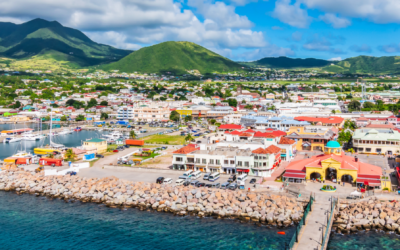
St Kitts Travel Guide for Families and Couples
This travel guide discusses everything you need to know before traveling to St Kitts. We will...

49 Digital Nomad Visas to Get: The Ultimate Digital Nomad Visa List
The world has dramatically changed in the past few years thanks to the pandemic. Now, workers and...
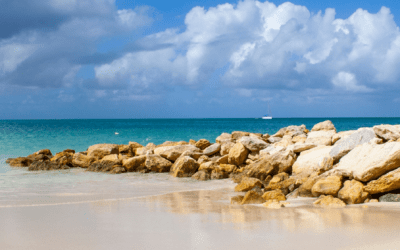
Traveling to Antigua: Our Favorite Luxury Hotels
This article discusses traveling to Antigua and our favorite luxury hotels there. The two sister...

The Best Beach Towns in Mexico for Families and Expats
This article discusses the best beach towns in Mexico for families and expats. We will also...
Get an Insurance Policy Against Your Government
Have options so that no one government controls you or your wealth. From strategic citizenship planning to real estate overseas, Nomad Capitalist has helped 1,500+ high-net-worth clients double their personal and financial freedom.
What do you want to accomplish?
Let us know your goal and we will tell you how we can help you based on your details.
REDUCE TAXES OFFSHORE
CREATE A GLOBAL PLAN B
DIVERSIFY AND PROTECT WEALTH

UNITED STATES

UNITED KINGDOM

EU COUNTRIES

Tax Amount ($US Dollars)
POLITICAL INSTABILITY
ECONOMIC INSTABILITY
MISSED OPPORTUNITIES
TRAVEL RESTRICTIONS
HIGH TAX LIABILITIES
RISK MANAGEMENT
MARKET PROTECTION
WEALTH PRESERVATION
OPPORTUNITY CAPITALIZATION
ESTATE PLANNING
Email Address
We handle your data according to our Privacy Policy . By entering your email address you grant us permission to send you the report and follow up emails later.

Where Are Most Superyachts Registered? (The Surprising Answer)

The concept of owning a superyacht is one that has captivated the minds of many for generations.
These luxury vessels are often seen as symbols of wealth and power, and the process of registering a superyacht in a certain country can be complicated.
In this article, we’ll take a look at where most superyachts are registered and the benefits and drawbacks of registering a superyacht in a different country.
We’ll also discuss what factors should be taken into consideration when deciding where to register a superyacht, and provide an overview of the process.
Finally, we’ll explore the potential future of superyacht registration and how it might evolve.
Get ready to dive into the deep waters of superyacht registration!
Table of Contents
Short Answer
Many superyachts are registered in the Cayman Islands due to its favorable tax and legal environment.
The British Virgin Islands is another popular jurisdiction for registering superyachts due to its proximity to the United States and relaxed regulation.
Monaco is also a popular option due to its proximity to the Mediterranean Sea and its tax advantages.
Finally, the United States is also a popular option for registration due to its stability and well-developed infrastructure.
What is a Superyacht?
A superyacht is a very large luxury motor or sailboat that is typically more than 24 meters in length.
These vessels are usually used for recreational purposes and for luxury trips around the world.
They are usually crafted with the finest materials and feature the most up to date amenities and technology.
Superyachts are a unique and exclusive type of vessel that requires special registration due to their size and luxury status.
These vessels often feature multiple decks, lavish interior and exterior design, multiple cabins, and a wide range of amenities such as hot tubs, pools, movie theatres, and spa-like facilities.
Superyachts may also come equipped with a wide range of water toys, such as jet skis and high-speed tenders, as well as other entertainment options like bars, nightclubs, and gyms.
The owners of superyachts tend to be affluent individuals or corporations, and these vessels can often cost tens of millions of dollars.
As such, they must be registered in countries that offer the most favorable tax and regulatory conditions.
This is why the Cayman Islands, Isle of Man, and Marshall Islands are the most popular destinations for yacht registration.
In addition to these countries, the United Kingdom, the United States, the Bahamas, and Malta are also popular registration locations.
The country of registration often depends on the preferences and requirements of the yacht’s owner, and can be changed with the right paperwork.
Popular Superyacht Registration Locations

When it comes to registering a superyacht, there are a few countries that are particularly popular.
The Cayman Islands, Isle of Man, and Marshall Islands are some of the most popular locations for yacht registration.
These countries offer favorable tax and regulatory conditions, making them ideal for yacht owners looking to minimize their costs.
The United Kingdom, the United States, the Bahamas, and Malta are also popular registration locations.
The United Kingdom offers a range of tax benefits to yacht owners, while the United States has an extensive network of marinas and ports.
The Bahamas and Malta are known for their relaxed regulations, allowing yacht owners to enjoy a worry-free experience.
The country of registration often depends on the preferences and requirements of the yacht’s owner.
Some owners may prefer a particular country due to its tax benefits, while others may be looking for a more relaxed regulatory environment.
It is also important to consider the local laws and regulations of the country in question, as these could have an impact on the yacht’s operations.
Thankfully, it is possible to change the registration of a superyacht with the right paperwork.
Ultimately, it is up to the yacht owner to decide where to register their superyacht.
Fortunately, there are a number of countries that offer favorable conditions and regulations for yacht owners, allowing them to get the most out of their vessel.
The Benefits of Superyacht Registration in Certain Countries
When it comes to superyachts, the country of registration can make a huge difference.
Not only does it affect the yachts taxes and other legal matters, but it can also provide plenty of benefits for the owner.
Many countries have become popular locations for yacht registration because they offer attractive tax and regulatory conditions.
For instance, the Cayman Islands, Isle of Man, and Marshall Islands are all popular locations for yacht registration.
The Cayman Islands offer yacht owners a favorable tax regime and flexible regulations, while the Isle of Man and Marshall Islands both offer a wide range of benefits, such as low taxes and the ability to register a yacht anonymously.
The United Kingdom, United States, Bahamas, and Malta are also popular locations for yacht registration.
The United Kingdom is known for its strict regulations, but also offers owners some benefits, such as a favorable tax regime.
The United States has one of the most comprehensive yacht registration systems in the world, and also offers owners some benefits, such as favorable taxes and convenient access to ports.
The Bahamas and Malta both offer yacht owners low taxes, flexible regulations, and other benefits.
Ultimately, the country of registration for a superyacht depends on the preferences and requirements of the owner.
With the right paperwork, an owner can easily change the yachts registration to a new country.
By doing so, they can take advantage of the benefits offered by that country, while still maintaining the yachts original registration.
The Factors That Determine Where a Superyacht Should be Registered

When it comes to registering a superyacht, there are several factors to consider.
The most important factor is the countrys tax and regulatory conditions.
Many countries offer favorable tax and regulatory regimes that can significantly reduce the costs associated with registering a superyacht.
Additionally, the countrys legal system should be taken into account.
Many countries have laws that are beneficial for superyacht owners, such as laws that allow for the use of limited liability companies to purchase yachts.
The yacht owners preferences are also a major factor in determining where a superyacht should be registered.
Different countries have different requirements for yacht registration, which can affect the cost and ease of registering a superyacht.
For example, some countries require the yacht owner to be present in person in order to register the yacht, while others allow for registration to be done remotely.
Additionally, some countries require the yacht to be physically present in the country in order for the registration to be valid, while others allow for registration to be done without the yacht being physically present.
Finally, it is important to consider the cost of registering a superyacht in a particular country.
The cost of registering a superyacht can vary from country to country, and it is important to ensure that the country chosen for registration offers the best value for the yacht owner.
Additionally, the availability of professional services such as yacht brokers and lawyers should also be taken into account, as these services can provide invaluable guidance and assistance in navigating the registration process.
The Process of Registering a Superyacht in a Different Country
When it comes to registering a superyacht in a different country, there are a few things to consider.
First, the owner must determine what country offers the most favorable tax and regulatory conditions.
Many countries have their own individual regulations and requirements, so it is important to research what is required for registration in each jurisdiction.
Once the owner has selected the desired country, the next step is to obtain the necessary paperwork and documents to file for registration.
This can include a valid registration certificate, letter of intent to register, and proof of ownership.
Depending on the country, additional documents and fees may be required.
Once the paperwork has been finalized, the next step is to submit the documents to the proper authorities.
This can be done in person or through an authorized representative.
Depending on the country, the registration process can take anywhere from a few weeks to several months.
Once the registration is complete, the yacht owner can receive a certificate of registration and be able to officially operate their vessel in the new country.
In addition to submitting the necessary paperwork, the yacht owner must also meet any other requirements for registration in the new country.
This can include having the vessel inspected and meeting any necessary safety standards.
It is also important to ensure that the yacht meets all applicable environmental regulations, such as regulations related to emissions or fuel efficiency.
Once the superyacht has been registered in the new country, the owner must also be aware of any ongoing requirements for operation.
This can include paying taxes, adhering to local regulations, and maintaining the vessel in a safe and seaworthy condition.
Ultimately, registering a superyacht in a different country can be a complex and time-consuming process.
However, with the right information and preparation, it can be a relatively straightforward process that results in a great deal of peace of mind for the vessel’s owner.
Potential Drawbacks of Registering a Superyacht in a Different Country

When it comes to registering a superyacht in a different country, there are some potential drawbacks that must be considered.
First, there is the issue of taxation, as many countries will require the yachts owner to pay tax on the vessel, depending on the rules of the country in which the yacht is registered.
Additionally, different countries have different regulations regarding the operation of the vessel, which can be a challenge for the yachts owner to comply with.
Finally, registering a yacht in a different country can result in customs and immigration issues when visiting other countries.
In some cases, the yacht may be subject to restrictions in terms of where it can travel, and the crew may need to obtain visas in order to operate the vessel in certain countries.
All of these potential drawbacks must be taken into consideration before registering a superyacht in a different country.
The Future of Superyacht Registration
As superyachts become increasingly popular, the demand for yacht registration is only expected to increase.
With more countries realizing the potential economic benefits of registering superyachts, and governments around the world encouraging their citizens to invest in luxury yachts, theres no doubt that the availability and options for yacht registration will continue to expand.
In the future, many countries are likely to offer attractive tax and registration incentives to yacht owners, making it easier to register their vessels.
This could mean lower registration fees, tax breaks, and other benefits that make it easier for yacht owners to register their vessels.
In addition, as new technologies become available, the process of registering a yacht may become even more streamlined.
For example, blockchain-based registration systems have been proposed, which could make it easier to track and verify yacht registration documents.
In the future, the availability of yacht registration will likely become much more global, with yachts being registered in more countries and jurisdictions than ever before.
This could mean that yacht owners have more options for registering their vessels, as well as more flexibility when it comes to which country they choose to register in.
Finally, as superyacht technology advances, its likely that more countries will begin to recognize the potential economic benefits of registering superyachts, and will start to offer incentives to attract yachters to their shores.
This could mean even more options for registering a superyacht, and even more attractive tax and registration benefits for yacht owners.

Final Thoughts
It’s clear that registering a superyacht in the right country can have significant financial and legal benefits.
However, there are also potential drawbacks that must be considered.
To determine the best registration location for your superyacht, it is important to consider your preferences and requirements, the benefits and drawbacks, and the process for registering in a different country.
With the right research and preparation, you can make sure your superyacht is registered in the best possible location.
James Frami
At the age of 15, he and four other friends from his neighborhood constructed their first boat. He has been sailing for almost 30 years and has a wealth of knowledge that he wants to share with others.
Recent Posts
Does Your Boat License Expire? Here's What You Need to Know
Are you a boat owner looking to stay up-to-date on your license requirements? If so, youve come to the right place! In this article, well cover everything you need to know about boat license...
How to Put Skins on Your Boat in Sea of Thieves? (Complete Guide)
There is a unique sense of pride and accomplishment when you show off a boat you customized to your exact specifications. With Sea of Thieves, you can customize your boat to make it look like your...

The global authority in superyachting
- NEWSLETTERS
- Yachts Home
- The Superyacht Directory
- Yacht Reports
- Brokerage News
- The largest yachts in the world
The Register
- Yacht Advice
- Yacht Design
- 12m to 24m yachts
- Monaco Yacht Show
- Builder Directory
- Designer Directory
- Interior Design Directory
- Naval Architect Directory
- Yachts for sale home
- Motor yachts
- Sailing yachts
- Explorer yachts
- Classic yachts
- Sale Broker Directory
- Charter Home
- Yachts for Charter
- Charter Destinations
- Charter Broker Directory
- Destinations Home
- Mediterranean
- South Pacific
- Rest of the World
- Boat Life Home
- Owners' Experiences
- Interiors Suppliers
- Owners' Club
- Captains' Club
- BOAT Showcase
- Boat Presents
- Events Home
- World Superyacht Awards
- Superyacht Design Festival
- Design and Innovation Awards
- Young Designer of the Year Award
- Artistry and Craft Awards
- Explorer Yachts Summit
- Ocean Talks
- The Ocean Awards
- BOAT Connect
- Between the bays
- Golf Invitational
- Boat Pro Home
- Pricing Plan
- Superyacht Insight
- Product Features
- Premium Content
- Testimonials
- Global Order Book
- Tenders & Equipment
The Register is the definitive guide to the largest, fastest and most iconic superyachts in the world. BOAT International’s list of the top 25 largest yachts in the world profiles the biggest, most innovative and most notable motor and sailing superyachts on the water today.
Find a breakdown of the 50 largest sailing yachts in the world and the 50 largest luxury yachts built in the US . For yacht owners with a passion for the exploration, there is the top 20 expedition yachts – superyachts that meld luxury yacht amenities with explorer yacht capabilities – and for those with a need for speed, we present the top 20 fastest superyachts plying the oceans.
From our partners
Sponsored listings.
DriveMag Boats
Your ultimate resource for anything ship-related
Where to register your superyacht?
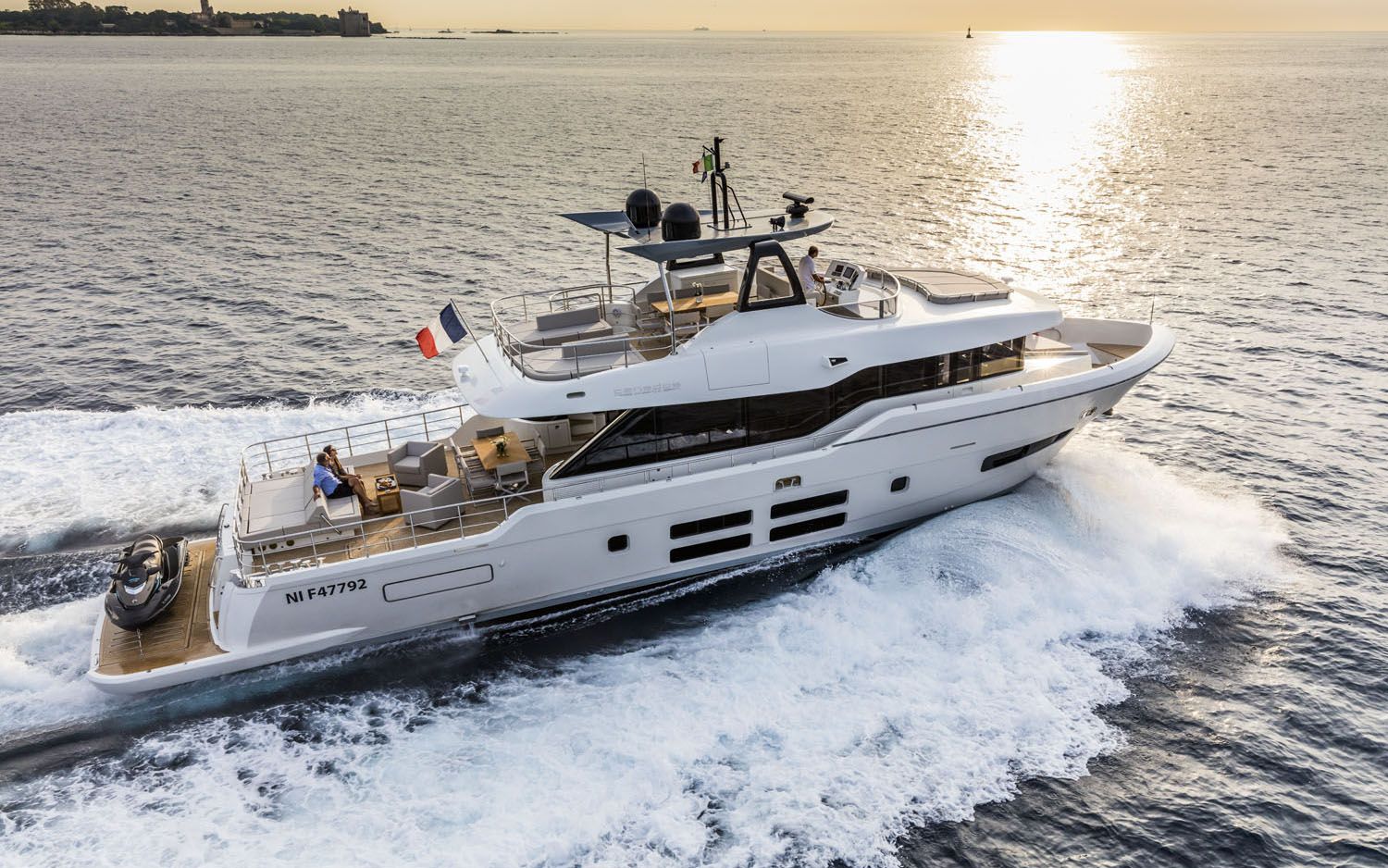
Why so many island flags?

If you passed by a luxurious marina in the south of France or a Spanish island, you'll notice a lot of superyachts. But almost none of them are carrying a known flag on the jackstaff.
The flag you choose for your superyacht will have a direct impact on your taxes, privacy and the vessel's success as a business. There are no simple answers here, but there are some general rules.
Choosing an offshore state to register your superyacht makes sense especially if you will charter the vessel as a business. Registering your vessel with an offshore flag can bring many benefits: a lighter tax burden, confidentiality of ownership, better rates from banking and insurance companies. If you choose to use the yacht only for private enjoyment and not charter it, you might register the vessel in your home country.
In choosing the flag, a good starting point is the so-called White List as maintained by the Paris Memorandum of Understanding on Port State Control (Paris MoU).
The Paris MoU is made of 27 participating maritime administrations and covers the waters of the European coastal states and the North Atlantic basin. The states are ranked on three lists: white list, grey list and black list. The states on the White List have demonstrated strong performance in safety, security and environmental standards. Flags on the Grey and Black Lists are deficient and vessel risk inspections and even detentions.
Cayman Island flag
The favorite flags for the majority for superyacht owners are those of the British overseas territories, commonly known as the Red Ensign Group. Almost 80% of the yachts and superyachts are registered in the Cayman Islands, Gibraltar and Isle of Man.
Sailing under one of these flags provides protection of the British maritime law, commercial confidentiality and adherence to the Large Yacht Code (LYC)
The registry with the largest number of yachts is the Cayman Island Shipping Registry. The port of George Town is the homeport of the majority of superyachts.
Also part of the Red Ensing Group are Guernsey, Jersey, Anguilla, Bermuda, British Virgin Islands, Falkland Islands, Montserrat, St. Helena and Turks & Caicos.
Out of the 13 members, only the UK and Gibraltar are EU-flags. Another popular flag with the superyacht owners is the one of the Pacific nation of Marshall Islands.

By SuperyachtNews 31 Aug 2022
The Superyacht Owner Report is Out Now!
The highly anticipated superyacht owner report is now available online...….

The Superyacht Owner Report is now available online! For those of you who are already members, you can access the link here , for those of you who are not, you can sign up to become an Essential Member here . The quickest, most efficient, and most environmentally friendly way to access our unrivalled journalism is via our online platform, and so we encourage all our loyal readers to make the digital transition. We are also pleased to announce that we will be offering a special discounted subscription at this year's Monaco Yacht Show . You can find us in Dars Sud - Stand DS98 - to meet the team, grab a drink and learn more about our membership offers .
The brief for this year's edition of The Superyacht Owner Report was to come up with something refreshing, insightful, and revelatory. After all, it is our 30th anniversary this year and we wanted to do something special, so we opened up a dialogue with some of the most exciting and candid market commentators in the superyacht industry. Our 30 for 30 section includes rising stars, experienced gurus, and visionary thinkers from a variety of different sectors. Instead of being retrospective, we thought it would be better to look into our crystal ball for the future and highlight the key aspects of our industry that need to become our focus of attention for the next 30 years.

The report would of course be incomplete without insight from superyacht owners. Our Editor Jack Hogan interviewed Steve Sidwell, owner of M/Y Ascente, about redefining the industry's approach to sustainable construction. We also spoke with Victor Vescovo about his incredible deep-sea expeditions and the potential we have as an industry to bring about positive environmental change.
We delved into the strange world of the metaverse and realised there was plenty of room for a new and improved superyacht industry. We spoke to Bernard d’Alessandri, General Secretary and Managing Director of Yacht Club de Monaco, about the hub's evolution from a cosy yacht club to a world knowledge bank. Our intelligence team also forensically examined the state of UHNWI's wealth, with a specific look into Billionaires, Millennials and the true potential of new money entering the yacht market.
We conclude The Superyacht Owner Report by confronting the issue of predatory behaviour in the superyacht industry. This topic is of course not exclusive to the superyacht industry, but nevertheless, there is a need to put pressure on those with the power to bring about real change, so that the perpetrators of abuse on board and shoreside face the consequences of their actions.

We are fully committed to working towards a greener superyacht industry. And we, as a team, aim to do all we can to ensure that we are part of the solution. That’s why we are encouraging our loyal readership to make the switch to digital media consumption, instead of print. And the best way to do that is to become part of The Superyacht Group Community . Issues of The Superyacht Report are only available to read to those with an Essential or Executive Membership .
Essential Membership grants members access to the full suite of business-critical content available across SuperyachtNews.com and The Superyacht Report, including access to our complete library of back issues, and unlimited access to SuperyachtIntel . To celebrate our 30th anniversary, we are offering you £30 off Essential Membership.
Executive Membership includes delegate access to our flagship event in Amsterdam , The Superyacht Forum Live , and the industry’s most dynamic conference programme, broadcast from the industry’s leading superyacht hubs, as well as all features included within the Essential Membership .
Profile links
The Superyacht Group
Join the discussion
To post comments please Sign in or Register
When commenting please follow our house rules
Click here to become part of The Superyacht Group community, and join us in our mission to make this industry accessible to all, and prosperous for the long-term. We are offering access to the superyacht industry’s most comprehensive and longstanding archive of business-critical information, as well as a comprehensive, real-time superyacht fleet database, for just £10 per month, because we are One Industry with One Mission. Sign up here .
Related news
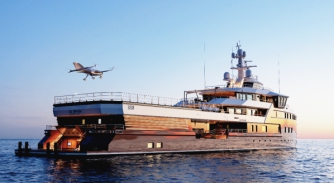
British company aims to attract superyacht owners with flying car concept
The new electric vertical takeoff and landing vehicle has been named "The Axe"
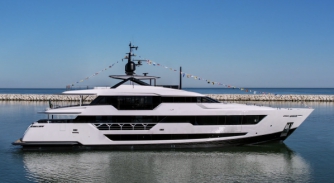
Ferretti Group publishes H1 2022 financial report
Double-digit revenue growth and €1.2 billion order book backlog reported
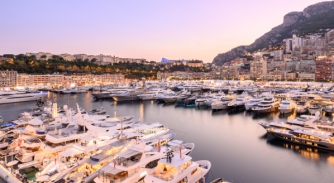
Monaco Yacht Show releases first list of superyachts
A sneak peek at the yachts so far confirmed for the 2022 show
.jpg)
MYS 2022 is set to target Gen Z
Monaco Yacht Show organisers have said that their focus this year is to seduce and educate their audience
2 years ago
Sign up to the SuperyachtNews Bulletin
Receive unrivalled market intelligence, weekly headlines and the most relevant and insightful journalism directly to your inbox.
Sign up to the SuperyachtNews Bulletin
The superyachtnews app.

Follow us on
Media Pack Request
Please select exactly what you would like to receive from us by ticking the boxes below:
SuperyachtNews.com
Register to comment

Yacht Registry
Search our library.
Find the forms and publications you need in one place.
View the RMI Yacht Code
Learn more about the most recent edition of the RMI Yacht Code.
Receive specialized support from a member of the yacht team.
The RMI allows, through its national legislation and the RMI Yacht Code, the registration of private yachts, private yachts limited charter, commercial yachts, and passenger yachts. It also allows for RMI flagged private yachts to charter in French and Monégasque waters without the need for commercial registration by requesting a Temporary Certificate of Registry for Yacht Engaged in Trade.
Yacht owners can choose the home port of either Bikini or Jaluit. Two yachts may share a common name as long as they are registered in different home ports.
Like commercial vessels, ownership of yachts registered in the RMI must be through an RMI corporation, limited or general partnership, limited liability company, or a qualified foreign maritime entity.
Discover More
- Vessel Registration
- Tonnage Tax Calculator
- Business Entities
- Seafarer Verification
- Emergency Contact
- Office Locations
Subscribe to our Newsletter
Receive recent news and never miss an update.
Click here to sign up for our news .

This site uses cookies. By continuing to browse the site, you are agreeing to our use of cookies.
Cookie and Privacy Settings
We may request cookies to be set on your device. We use cookies to let us know when you visit our websites, how you interact with us, to enrich your user experience, and to customize your relationship with our website.
Click on the different category headings to find out more. You can also change some of your preferences. Note that blocking some types of cookies may impact your experience on our websites and the services we are able to offer.
These cookies are strictly necessary to provide you with services available through our website and to use some of its features.
Because these cookies are strictly necessary to deliver the website, refusing them will have impact how our site functions. You always can block or delete cookies by changing your browser settings and force blocking all cookies on this website. But this will always prompt you to accept/refuse cookies when revisiting our site.
We fully respect if you want to refuse cookies but to avoid asking you again and again kindly allow us to store a cookie for that. You are free to opt out any time or opt in for other cookies to get a better experience. If you refuse cookies we will remove all set cookies in our domain.
We provide you with a list of stored cookies on your computer in our domain so you can check what we stored. Due to security reasons we are not able to show or modify cookies from other domains. You can check these in your browser security settings.
We also use different external services like Google Webfonts, Google Maps, and external Video providers. Since these providers may collect personal data like your IP address we allow you to block them here. Please be aware that this might heavily reduce the functionality and appearance of our site. Changes will take effect once you reload the page.
Google Webfont Settings:
Google Map Settings:
Google reCaptcha Settings:
Vimeo and Youtube video embeds:
The unspoken rules about how to behave on a superyacht
- The superyachting world is very small, with only 5,800 yachts longer than 30 meters at sea.
- That insularity has bred a specific etiquette, which is often hard for outsiders to know about.
- These are the de facto rules of the most expensive billionaire toys, superyachts .

For the owners of superyachts , privacy is often the most valuable thing money can buy. It's one reason centimillionaires and billionaires pay eight or nine figures for a palace at sea, far from the prying eyes of land dwellers.
Even the most gossipy crew members should stay tight-lipped about the name of a former owner or charter guest, and many brokers shy away from answering benign questions.
That means that, aside from basic safety guidelines, most of the rules of superyachting are unwritten. The very few who need to know them — there are only about 5,800 yachts longer than 30 meters at sea, according to SuperYacht Times — already know them.
But if you do happen to be a lucky guest at a party on a billionaire's $500 million ship or find yourself included in a $1 million-a-week vacation, there are a few things you need to know.
After four days of touring superyachts that sell for as much as $75 million and chatting with the people who buy, sell, and work on them at the Palm Beach International Boat Show , Business Insider gleaned a few key edicts. Given the discreet nature of the industry, almost all the people we spoke with requested anonymity to protect their working relationships, but here's what they had to say.
Take off your shoes
While it's a basic rule for anyone in boating, it may come as a surprise to an outsider that no matter how rich you are or how expensive your heels are, in the vast majority of cases, you can't wear shoes on board.
It's partly for safety — you don't want anyone slipping on a wet deck — but partly to keep the yacht clean. So expect to see barefoot billionaires, and if you forgot to get a pedicure, bring a set of special boat shoes.
Don't make any assumptions about money — but know the signs
In the superyacht world, it's safe to assume almost everyone you meet is very, very rich, and many brokers and builders say you can't judge a book by its cover when it comes to prospective clients.
"It has nothing to do with how they're dressed," one broker told BI. "It's the biggest mistake you can make because a complete slobby-looking guy or couple could be a multibillionaire."
There are, however, a few clues. Watches are one; new footwear is another.
"Rich people always have new shoes," a superyacht expert said. But because of the shoe rule mentioned above, this tip probably applies only when they're on land.
Book your massage early
Wellness areas, including spa rooms with a massage bed or two and a professional-grade facial machine, are becoming must-haves on superyachts . Most have a customized spa menu and a crew member who doubles as a trained masseuse or beautician — and they're usually in high demand.
One captain said he'd implemented a booking system to ensure people weren't fighting for the same spots. A broker said sometimes masseuses would be so busy they wouldn't leave the small spa cabin for hours on end.
Related stories
So if you want to make the most of your relaxing time on board, reserve your pampering slot as soon as you get your welcome cocktail.
Pirates are more real than you'd think, and many superyachts have hidden safe rooms
While you might dress up as a fake pirate for an onboard theme party, there are very real ones — and other dangers — on the high seas.
In certain areas, including parts of the Indian Ocean and the Gulf of Aden, pirates are a cause of concern . In the Red Sea, owners are concerned about the Houthis .
Superyachts can come equipped with sonic weaponry, lockdown systems, and anti-drone protection. Builders are even designing safe rooms — which are apparently just as plush as the rest of the ship.
The longer the boat, the closer to $1 billion
While you can't judge a buyer based on appearances, you can judge them on the length of their boat.
One rule of thumb: If someone has a brand-new 50-meter vessel, chances are they have $1 billion to their name. If it's over 100 meters, expect the owner to have at least $2 billion. And for a boat bigger than that — like Jeff Bezos' 127-meter megayacht Koru — it takes many, many billions.
Money can't buy you everything
The world's biggest, most expensive yachts are custom-built by shipyards that produce only a handful of boats a year.
But no matter how many tens of millions of dollars clients are spending, there are things to which builders will refuse to say yes.
"In the end, the boat has our name," an executive from one of the world's biggest shipyards told BI.
They recalled a client who requested a yellow hull to match his Lamborghini . The shipyard declined, steering the client in another direction.
"If I don't like it, I don't build it. I finalize two or three contracts a year," another builder said. "If somebody can say your vessel is ugly, my reputation is bad."
Yacht crews are trained to make the impossible possible. A guest requests fresh caviar flown into the middle of the Caribbean? No problem. Fresh flowers every day while at sea? It'll cost you, but it can be done.
But they can't time travel, and captains and crew members say the thing that causes the most friction is when a client or owner wants to go from point A to point B — right now.
"The hardest request is when they want the boat in a place — yesterday," one captain said.
The best person to know? A friend with a superyacht
Superyachts are expensive to build and expensive to maintain . According to the industry standard, owning a superyacht will cost 10% of its new-build price annually. For a $100 million yacht, that's at least $10 million yearly going to crew, regular maintenance, insurance, fuel, and dockage.
Chartering, too, is costly . Beyond the list price, which can be hundreds of thousands a week, guests must pay for provisions, which are pegged at 35% of the charter fee, and are expected to tip between 10% and 20%.
So the most important unspoken rule of superyachting is actually that the only thing better than owning a superyacht is knowing someone else who does — and invites you along, of course.
Watch: Why it costs $1 million a day to run one of the world's biggest cruise ships
- Main content
Billionaire fights to dock his boat on water behind his house. His 164-foot boat, that is.
The love of the water, and a mega-yacht to enjoy it, is putting one resident at odds with village of north palm beach leaders..
For some people, the ultimate Florida lifestyle is a waterfront house , a private dock and a boat parked next to it. But what if that boat is a mega-yacht , and the mega-yacht stretches 164 feet?
That's the conundrum facing the Village of North Palm Beach.
This tiny community in northern Palm Beach County, with only 13,000 full-time residents, has an identity so tied to the water that a ship's steering wheel is the village's emblem.
But it's that love of the water that is putting one resident at odds with village leaders.
For the past several years, homeowner Michael Bozutto has been battling the village for the right to park his 164-foot Westport, dubbed Honey, behind a home he owns at 932 Shore Drive.
The house, built in 1961, is a one-story, ranch-style property with three bedrooms on a half-acre lot. Bozzuto paid $840,247 for the house in 2014, according to Palm Beach County property records.
Lawsuit rooted in dispute over where to dock mega-yacht
What makes this plain house special is its location. It's on a rare corner bordered on the north and east by navigable waters that provide access to the Atlantic Ocean via the Lake Worth Inlet. The east-facing dock is large enough to accommodate Bozzuto's motor yacht.
Since Bozutto bought Honey for an undisclosed sum a decade ago, he mostly has parked it at the Old Port Cove Marina, near Tiger Woods' 155-foot showy mega-yacht, ironically dubbed Privacy.
More recently, Bozzuto has wanted to park Honey alongside his Shore Drive house, one of four houses he owns in the village. While Bozzuto keeps some personal property at the Shore Drive house, he lives at a house he owns at Harbour Isles Court.
Village officials warned Bozzuto he can't park Honey at 932 Shore Drive because boats can only be parked on docks behind houses that are occupied by the homeowner.
But village rules do not define the word "occupied." For instance, the rules do not state that occupied means the house is a residence where the owner lives. Village rules also contain no restrictions on the size of boats that can be kept at private docks.
After years of pushing back against what he believes are fuzzy rules, Bozzuto in March filed a lawsuit against the village.
More: Cannonsport Marina sells for $58.5 million in big deal for tiny Palm Beach Shores
He alleged the municipality is illegally depriving him of his property rights because nothing in the village code prevents him from mooring Honey at his house. He is asking a Palm Beach County Circuit Court judge to rule that he has a constitutional right to dock Honey there.
Gregory Coleman, Bozzuto's West Palm Beach attorney, said the village has plenty of waterfront homes with yachts parked behind them. But Coleman said the village is illegally blocking Bozzuto from docking Honey at his house because the village is bending to pressure from a handful of neighbors who think the boat is too big.
The selective enforcement is wrong, said Coleman, a former president of the Florida Bar.
"He's a very under-the-radar guy who doesn't cause anybody any problems," Coleman said of Bozzuto. "He pays his property taxes, and he wants to be left alone by the village of North Palm Beach. Unfortunately, they are singling Mike out."
Neither Leonard Rubin, the village's longtime attorney, nor Village Manager Chuck Huff responded to requests for comment.
Eric Stettin, a Fort Lauderdale-based attorney who is representing the village in the Bozzuto lawsuit, said he could not comment on pending litigation.
What good is a man's castle if he can't have a boat in his moat?
Coleman's lawsuit describes the conflict as a battle over property rights, but real estate and yachting experts say it's also a sign of the times.
As wealthy new residents pour into the county wanting all the perks of the Sunshine State, they want a boat to go along with their waterfront homes and golf club memberships. Some longtime residents fear Palm Beach County is turning into a playground for billionaires, to the detriment of everyday people who also want to live in sunshine and peace.
This conflict between Old Florida and new money is an ever-present tension, but even seasoned yacht brokers say they've never seen interest in luxury yachts quite as strong as it is now.
More: Illegal boat slips are popping near Palm Beach Gardens. Residents want regulators to act
"What we've seen in the marketplace right after COVID in the yachting industry, and especially the superyacht segment, is the most incredible growth ever seen in the history of yachting to date," said Shannon McCoy, a luxury yacht advisor and broker with Worth Avenue Yachts in Palm Beach.
"A lot of people are moving here with serious money," added Pascal Savoy, U.S. managing director of Camper & Nicholsons International yacht brokers in Fort Lauderdale.
While in the past Palm Beach County was not considered lively enough for some buyers, Savoy said the county's growing sophistication is putting it on the map in a way never seen before.
"It's a mini-Monaco for us," Savoy said.
Prices for mega-yachts can range from $18 million to $60 million, or many times that, for the largest and most decked-out mega-yachts, Savoy said.
While some yachts can be glitzy, a 164-foot Westport is considered a more low-profile boat, Savoy added.
Michael Bozzuto's interests: Houses, boats and philanthropy
Bozzuto is no newcomer to North Palm Beach. He's been a resident of the village for 20 years.
He is the billionaire owner of a family-owned supermarket wholesaler in Connecticut, and an investor and philanthropist who likes to collect houses and yachts, Coleman said.
In addition to the four North Palm Beach houses and several yachts he owns, Bozzuto in February paid a whopping $31.1 million for a house in the Town of Palm Beach Shores. The house, which has two docks, sits just north of the Palm Beach/Lake Worth Inlet.
Twin City Mall: North Palm clears way for redevelopment, taller buildings at landmark site
Coleman said there is plenty of room for other boaters to navigate the waterway when Honey is parked at the Shore Drive house in North Palm Beach. And while other people may not have as large a yacht, there are other sizeable yachts parked on docks behind other North Palm Beach homes, too, he added.
At a 2017 village council meeting, then-Mayor Darryl Aubrey commented on the issue, according to the complaint.
"When I didn't live here full time, I had a boat sitting in my dock, I was gone nine months of the year. I don't see how you can say that someone has to be in a residence year-round, seems to be some interpretation of occupant, there would be an enormous number of violations," Aubrey said.
Another member of the village council asked if the village had a definition now, the complaint said.
Rubin, the village attorney, replied: "No, we don't," according to the lawsuit.
Show me the money? Here it is: West Palm and Palm Beach rank in top 5 as cities with fastest growth in millionaires
Palm Beach County's waterways run deep, and they are popular
The yacht docking dispute is particularly timely, given the scarcity of dock space for boats of all sizes.
The most convenient place to park a boat is on the water behind a house, brokers say. But not every waterway or channel can accommodate the draft, or depth, of a mega-yacht.
However, the dock behind Bozzuto's Shore Drive house can.
Not only is the Westport not known for its deep hulls, but the waterway also is typical of northern Palm Beach County, which boasts deep water and easy access to the ocean via the Lake Worth Inlet, said Coleman, a lifelong boater.
"In Palm Beach County, they have deeper water, and it allows people to have larger yachts," Savoy agreed.
But not every waterway is deep enough for every boat.
McCoy said she specializes in helping advise potential yacht owners about the county's varied water depths before they buy a house, if they plan to dock their yacht behind it.
If yacht owners don't have a private dock, the other option is a marina. But marina space is hard to find, with many dock berths reserved for months in advance, McCoy said.
Despite the challenges of owning a boat and finding a place to dock it, yacht brokers say demand continues.
They see interest continuing from business executives moving here with their families as they relocate their companies to Palm Beach County. There's also a growing demand for yachts among female buyers, McCoy added.
They also see younger mega-yacht buyers, some even in their early 30s. This is in sharp contrast to the mostly older buyers in the past, Savoy said.
Palm Beach County may not be as go-go as Miami-Dade County when it comes to showy ships, but if interest continues, "it's coming," Savoy said. "You're going to attract bigger yachts."
Put another way: "No one needs a boat, but everyone needs a boat," McCoy said. "It's the ultimate lifestyle."
Alexandra Clough is a business writer and columnist at The Palm Beach Post . You can reach her at [email protected] . Twitter: @acloughpbp . Help support our journalism. Subscribe today.

There were errors found during form check. Check fields and try again.
Registration in Russia: what it is and how to arrange it
Registration in Russia is one of the most important issues for foreigners coming to this country, especially for those who plan to stay in a flat or in a private home. I will try to clarify the basic moments in the article below.
What is a registration?
The registration is a procedure in which Russian authorities get information of your residence so that they can find you if needed.
Often this procedure is considered as a relic of the times of the USSR when the authorities controlled all the migration flows and could restrict people’s movement in the country.
It’s really good that since 2011 the procedure of registration has become simpler and now it’s actually easy for those foreigners who come to Russia.
However, despite the obvious simplification, some aspects stay unclear so every organization gets it in its own way.
In this article, I will try to explain what every foreigner has to know about the registration (however, the main responsibility falls on the receiving party).

When you really don’t need the registration
If you stay in Russia for less than 7 days, you don’t need to register. For example, you came to Russia on Saturday, the 1 st of August, and left the country on Monday, the 10 th of August. This means that you did not need to register because you have stayed in Russia for 6 working days (weekend days, Saturdays and Sundays, are not considered as working days).
The documents confirming your arrival and starting the counting of 7 working days are your plane/train/bus tickets.
In which cases is it necessary to register?
It is necessary to undergo the registration if you plan to stay in Russia for more than 7 days. If you crossed the border on Monday planning to stay for longer than next Tuesday, you have to register.
If you change cities, it is necessary to register in each new city (if you plan to stay there for more than 7 days). In this case, you will be “checked out” of one city and registered in another one upon arrival. If you stay in one city for 5 days and stay in another one for 5 days, it is enough to register in the first one because the overall period of your stay in Russia will amount more than 7 days. It is not necessary to register in the second city because you will stay there for less than 7 days.
In the case you come to Russia multiple times (by a double-entry or a multiple-entry visa), you need to undergo a registration every time you cross the Russian border (if you stay for more than 7 days).
Who arranges the registration?
The arrangement falls on the receiving party.
- Hotel. If you stay in a hotel that means the administration of the hotel is responsible for your registration.
- Rent apartment. The owner of the apartment carries out the registration whether it is a private person or a company.
- Private home. If you stay at your friend or relative, he/she has to register you to his/her home address.
The owner is always responsible for the registration. He/she has to be a citizen of Russia or a foreigner with a permanent residence in Russia.
The registration has to be undergone not later than in 7 days since the foreigner’s arrival.
Foreign nationals cannot register themselves because it is the responsibility of the receiving party. Actually, the foreigner does not even have to attend the registration.
Where do I have to register?
The registration can be issued:
- Directly in the regional authorities of the Directorate-General for Migration of the MFA of the RF. Earlier it was called the Federal Migration Service but this name was abolished in April of 2016.
- In any Russian post office (the cost is 216 rubles).
The procedure of the registration in Russia
If you stay in a hotel, the administration will register you freely although hostels or mini-hotels can ask you to pay a small amount of money (from 200 to 1000 rubles). It doesn’t matter if you stay in the hotel not mentioned in your invitational letter. Registration is a duty of every Russian hotel.

The registration requires the following documents:
- Foreign passport. The pages with your photo, personal data, and a visa will be copied.
- Migration card that also will be copied by the employees of your hotel.
With these documents, the administration will be able to fill in the special note of foreign national’s arrival.
The hotel’s administration is also responsible for the procedure of registration. The employees fill in the form and present it in addition to other documents to Russian migration authorities. You will be registered within 1-2 working days.
The main part of the form goes to the authorized body while you obtain the bottom part (separated by the dotted line) or the copy of this part as a confirmation of the address of your residence and the duration of your stay. The employees of the hotel also notify the authorized body of your departure.
In the case you stay in a private apartment (for example, by using the Airbnb service), your registration falls on the owner of the flat/house. You will probably have to pay for it (from 500 to 2000 rubles); sometimes the owner can even refuse to do it (although he is legally obligated to register you).
Before payment, ask your owners if they are going to register you and how much will it cost. If they refuse to register you or want too much money, seek for another apartment with registration for a reasonable price.
In the case, you have already paid for the apartment but the owner doesn’t want to register you, contact the company that has issued your invitation and ask if they can register you in the city of your stay. The organization will take a payment for the registration (in their own address or another one).
If the company that has issued your invitation do not provide registration services, you will have to seek for the organization offering this service. It has to have representation in the city where you will stay because you will have to apply to this company in person and bring the passport and the migration card.
If you stay at your relatives/friends, they can register you in any post office. In addition, you can use services of some of the organizations in the city providing such services.
Some details for a conclusion
- The registration is similar whether you come to Russia by a tourist or by a business visa. The only difference is that in the case you obtain a business visa, you can register for a period up to 3 months.
- If you travel through the Trans-Siberian route by train and stays in it for a night, your travel ticket is considered as a registration document and you should always keep it around.
- The Russian police is not authorized to ask for your registration in the street. The responsibility for all the violations falls on the receiving party. In the case, you have been asked for registration right on the street (which happens rarely), contact the consulate immediately.
- In order to leave the country, you don’t have to present the government registration but you do have to present a migration card.
I hope this article has been useful and helped you to understand how the procedure of the registration goes. You can share your experience below.

IMAGES
VIDEO
COMMENTS
Thank you for visiting our 'yacht owners register'. The information on this page is no longer updated. But our frequently updated version of the SuperYacht Owners Database is available for purchase here: Yacht Owners Database. The paid version does list much more yachts and yacht owners (more than 1,450 at the moment).
The Superyacht Directory is the world's largest database of private luxury yachts, with over 12,000 megayachts listed. It's the most authoritative place to find everything you need to know about superyachts - including new builds, historic vessels and the most famous boats of all time. You can filter your Superyacht Directory search ...
Choosing the right yacht register. Gabriel Gonzalez, Register-a-Yacht, explains how buyers should choose where to register their yacht. Registering a newly acquired yacht is often one of the last steps that yacht owners will need to complete before they can actually sail and enjoy the vessel. Registering a yacht is like obtaining a passport.
The Superyacht Owner Report, a logical continuation from 2020's The Superyacht Buyer Report, has been designed to provide owners with a physical and/or digital resource to demystify and optimise the ownership experience and, finally, put an end to the notion that there are only two moments to truly enjoy owning a superyacht.
The motor yacht Serene is one of the largest yachts in the world. With a length of 134 meters (or 439 ft). She was built by Fincantieri yachts. To design of Espen Oeino. The motor yacht can accommodate 24 guests. Serene has 12 guest cabins and 30 crew cabins. She has a crew of 54. She was registered to a UK-based company named Serena Yachting.
For this reason, many boat owners opt to register their yacht in places like the Cayman Islands to avoid the onerous taxes and regulations of the United States and other western governments. Panama, with its favorable registration policies, is the largest ship registry in the world with over 9,000 ships flying its flag.
The yacht owners preferences are also a major factor in determining where a superyacht should be registered. ... This could mean lower registration fees, tax breaks, and other benefits that make it easier for yacht owners to register their vessels. In addition, as new technologies become available, the process of registering a yacht may become ...
The Register includes some 750 superyacht owners with data about their yachts, their source of wealth, net worth and private jet (if any). Purchasing the Register will give you the right for updates during a period of 24 months. For a select group of parties (in the yacht or private jet industry) we have a version available which includes the ...
The advantages of registering in Florida are as follows: •Any person or company, domestic or international, can register a yacht in Florida. •There is an affordable registration fee after paying the sales tax and quick turnaround time to receive the registration. •Assuming all Federal issues are met, yachts registered in Florida may also ...
The Register. The Register is the definitive guide to the largest, fastest and most iconic superyachts in the world. BOAT International's list of the top 25 largest yachts in the world profiles the biggest, most innovative and most notable motor and sailing superyachts on the water today.. Find a breakdown of the 50 largest sailing yachts in the world and the 50 largest luxury yachts built ...
Almost 80% of the yachts and superyachts are registered in the Cayman Islands, Gibraltar and Isle of Man. Sailing under one of these flags provides protection of the British maritime law, commercial confidentiality and adherence to the Large Yacht Code (LYC) The registry with the largest number of yachts is the Cayman Island Shipping Registry.
What began as a pastime for yacht spotting has evolved into a leading online destination for yachting enthusiasts, with thousands of visitors engaging with our content every day. Launched in 2009, SuperYachtFan transitioned from a gallery of yacht imagery to a pivotal resource, culminating in the Super Yacht Owners Register —a meticulously ...
The Superyacht Owner Report is now available online! For those of you who are already members, you can access the link here, for those of you who are not, you can sign up to become an Essential Member here.The quickest, most efficient, and most environmentally friendly way to access our unrivalled journalism is via our online platform, and so we encourage all our loyal readers to make the ...
Launched in 2009, SuperYachtFan transitioned from a gallery of yacht imagery to a pivotal resource, culminating in the Super Yacht Owners Register—a meticulously compiled database featuring over 1,500 yacht owners. The allure of luxury yachts and their affluent proprietors has captured global interest, making our compilation a valued asset ...
Yacht owners can choose the home port of either Bikini or Jaluit. Two yachts may share a common name as long as they are registered in different home ports. Like commercial vessels, ownership of yachts registered in the RMI must be through an RMI corporation, limited or general partnership, limited liability company, or a qualified foreign ...
The U.S. Superyacht Association reports that on August 13, President Trump signed into law a bill that will allow American superyacht owners to finally fly an American flag and register their yachts over 300 GT in the United States. According to USSA, there are only two superyachts currently flying the U.S. flag. Photo courtesy Myrabella ...
Superyachts are expensive to build and expensive to maintain. According to the industry standard, owning a superyacht will cost 10% of its new-build price annually. For a $100 million yacht, that ...
For the past several years, homeowner Michael Bozutto has been battling the village for the right to park his 164-foot Westport, dubbed Honey, behind a home he owns at 932 Shore Drive. The house ...
In 2014-2015, Bolotov was the beneficiary of at least three Cypriot companies through firms registered in the British Virgin Islands together with Georgy Bedzhamov, the former co-owner of ...
The owner is always responsible for the registration. He/she has to be a citizen of Russia or a foreigner with a permanent residence in Russia. The registration has to be undergone not later than in 7 days since the foreigner's arrival. Foreign nationals cannot register themselves because it is the responsibility of the receiving party.